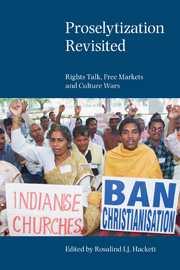Book contents
- Frontmatter
- Contents
- Preface and acknowledgements
- Contributors
- Revisiting Proselytization in the Context of Rights Talk, Free Markets and Culture Wars
- Section I
- Section II
- Section III
- Section IV
- Negotiating Proselytism in 21st Century Russia
- Between Da'wa and Mission: Turkish Islamic Movements in the Turkic World (Central Asia and the Caucasus)
- Siritual Wars in the 10-40 Window: Korean Proselytism among Russia's Asian Minorities
- Section V
- Index
Between Da'wa and Mission: Turkish Islamic Movements in the Turkic World (Central Asia and the Caucasus)
from Section IV
- Frontmatter
- Contents
- Preface and acknowledgements
- Contributors
- Revisiting Proselytization in the Context of Rights Talk, Free Markets and Culture Wars
- Section I
- Section II
- Section III
- Section IV
- Negotiating Proselytism in 21st Century Russia
- Between Da'wa and Mission: Turkish Islamic Movements in the Turkic World (Central Asia and the Caucasus)
- Siritual Wars in the 10-40 Window: Korean Proselytism among Russia's Asian Minorities
- Section V
- Index
Summary
In the last decade, Fethullah Gülen's community, the so-called fethullahci community, has become one of the most powerful religious groups in Turkey. Established in the early 1970's in Izmir, where Gülen was in office as a preacher of the Republic or vaiz, the community appears to be the successful heir of the first nurcu movement founded by Said Nursi (1870-1960) in the second half of the nineteenth century. The fethullahci or neo-nurcu community benefited from the economic growth and liberal measures encouraged by Turgut Özal's government in the 1980's. Indeed, external conditions favoured the development of Gülen's community—often qualified as cemaat (although this is not a term they use publicly)—and it soon became an empire supported by a great educational network. This chapter will demonstrate how the “nurcu” movement implemented private schools with the support of Turkish businesses, wherever Muslim Turks settled (mainly Central Asia and the Caucasus, or CAC) using an unorthodox method of proselytization. It will demonstrate that, in the case of Gülen's movement, their efforts to disseminate and revitalize Islamic belief and practice were influenced by Christian practice, in the sense that the fethullahci borrowed much from the Christian missionary movements of the beginning of the century in the Ottoman Empire. Lastly, this chapter will point out the contradiction between the movement's ideology and its pragmatic approach: while the fethullahci's identity in Turkey is essentially Islamic, their activities abroad contribute to the implementation of Turkish nationalism, rather than religious values.
- Type
- Chapter
- Information
- Proselytization RevisitedRights Talk, Free Markets and Culture Wars, pp. 365 - 388Publisher: Acumen PublishingPrint publication year: 2008



